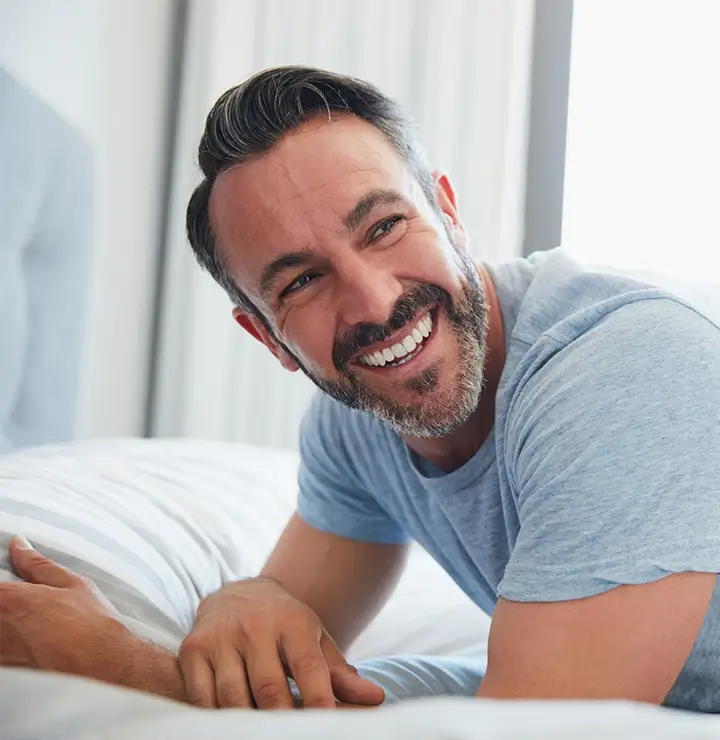Sleep Apnea
Apnea means "without breath." Sleep apnea causes its sufferers to temporarily stop breathing.
Obstructive sleep apnea occurs because sufferers have a physical obstruction — often in the nose, tongue or throat — that prevents them from breathing by mouth at night.
Symptoms
Obstructive sleep apnea is characterized by significant and prolonged interruptions of breathing and airway obstructions at night. Breathing often stops for a period of 10 to 20 seconds at a time. If the breathing stops for more than 10 seconds, it is considered severe obstructive sleep apnea.
Individuals with sleep apnea may complain of:
- Constantly feeling tired
- Sensation of never being fully rested
- Needing daytime naps
- Sore throat
- Sleepiness during the day
- Lack of energy
- Mood changes
- Lack of libido
- Headaches
Obstructive sleep apnea not only affects the quality of life of individuals, but also may be harmful to one’s health when uncontrolled. Obstructive sleep apnea may be associated with:
- Low oxygen levels
- Cardiac arrhythmias, or irregularities in the heart's normal beating pattern
- High blood pressure
Sleep apnea is a a serious disorder that may become a major risk to one's health, causing significant lung and heart problems over time and, rarely, sudden death.
Obstructive sleep apnea may occur in those who snore. However, not all people who snore have sleep apnea.
Diagnosis
Most loud snorers should undergo a sleep test. This is an overnight test that is usually performed in a sleep laboratory.
During the sleep study, you will sleep under observation for a number of hours. During this time, you are monitored for a number of important body processes, including:
- Heart rhythm
- Blood oxygen levels
- Brain activity
- Eye movements
- Muscle movements
- Number and duration of sleep apnea spells
Information from the sleep study will be used to determine how well you sleep and whether you have sleep apnea.
Treatment
Based on the results of your sleep study, you will be diagnosed with either primary snoring (which means snoring only) or as having obstructive sleep apnea.
There are a number of treatment options for both conditions.
Primary snoring
Primary snoring treatment can include nonsurgical or surgical approaches.
Nonsurgical treatment methods include:
- Losing weight
- Avoid lying on your back while sleeping
Surgical treatments may include:
- Radiofrequency procedures
- Palatal implants
- Injection snoreplasty
- Cautery-assisted palatal stiffening operation
Obstructive sleep apnea
For those suffering from OSA, treatment options generally include:
- Weight loss
- Sleeping prone or on the side only
- Continuous positive airway pressure (CPAP)
- Uvulopalatopharyngoplasty (UPPP)
- Upper and/or lower jaw advancement procedures
CPAP
CPAP is the first line of defense in managing obstructive sleep apnea. It also has the highest cure rate.
In CPAP, pressurized air is delivered by a face mask worn while you sleep. The pressure of the air is adjusted to maintain sufficient pressure to overcome airway obstruction. This eliminates most episodes of sleep apnea.
Many patients experience improved sleep patterns and more restful sleep while wearing this device; other patients find it cumbersome and difficult to use and will opt for surgical treatment. CPAP remains the best nonsurgical treatment for OSA.
UPPP
Thousands of patients have been effectively treated with the UPPP technique, which involves surgery to remove extra tissue in the throat.
While it does not cure all obstructive sleep apnea, it significantly reduces the severity in 50 percent to 60 percent of patients. It also typically eliminates or significantly reduces snoring.
The procedure is performed while you are under general anesthesia, and it typically requires that you stay in the hospital for one night.
For more information about our services, please call us at 714-509-2230.








